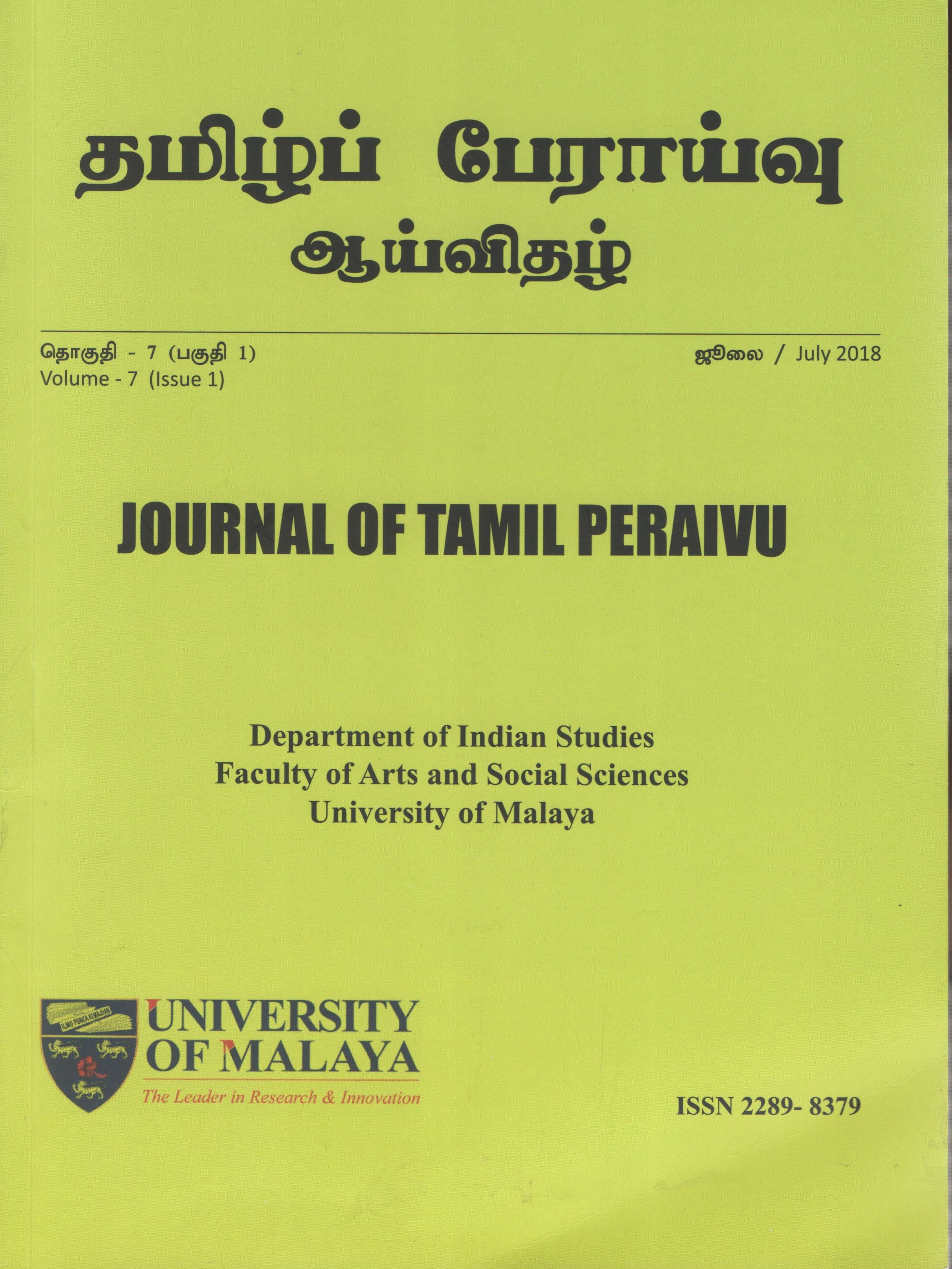இராமாயணமும் எதிர் கதையாடல்களும் (Counter-Narrating Ramayan)
DOI:
https://doi.org/10.22452/JTP.vol8no1.5Keywords:
Ramayan, Counter-Narrating, Aryan-Dravidian conflict, rationalization, re-fictionalisation, Dravidian ideology., இராமாயணம் , எதிர்கதையாடல், ஆரிய திராவிட மோதல், பகுத்தறிவாதம், மீள் புனைவாக்கம், திராவிட இயக்கக் கருத்தியல்.Abstract
Abstract
The epic Ramayana can be considered as a significant literary work that has a general consensus of creating harmony within India. Though it is a literary work that has been underwent minor changes in its form, since its inception, it continues to be a work that aids wide readership and re-fictionalisation. It can be considered as a self-articulated contemporary literature as it has a practical approach towards society, tradition and politics. Ramayan has led to the discourse of recent ideologies like feminism, Opposition of the ‘Varna’ system, Social injustice and Aryan-Dravidian conflict. The act of taking the story of Ramayan to the general public should be attributed to the Dravidian movement. The basic ideology of the Dravidian movement is to deny the existence of god, which in turn , made the movement critic the ‘Puranas’ and ‘Ithihas’ , especially Ramayan, thus creating literary texts that are counter-narrations and criticisms to the epic. The ritualistic tradition of devotion towards Rama fell under staunch criticism. The movement through rationalization doctrines placed itself against Puranas that insisted on Theism. Also, the Dravidian movement exhibited itself to be against Nationalist politics by the use of Aryan-Dravidian conflict as the subject content in their literary works and Ramayan was often quoted as an example of the conflict. The ideology was put into practice, more often, by criticizing Ram and Ravana was praised on the contrary. It created an impact that the epic is anti-Tamil. Thus the research article intends to focus on Ramayan, as a literary work to be categorized among modern literature through the general acceptance and disapproval specifically by the dravidians, as a literary work that serves as a tool to elucidate Dravidian ideology, and finally as a literary work that exposes, by analysis, the ideology of Dravidian movement in retrospect through works that resulted out of the aforesaid conflicts.
Key Words: Ramayan, Counter-Narrating, Aryan-Dravidian conflict, rationalization, re-fictionalisation, Dravidian ideology.
ஆய்வுச்சுருக்கம்
இராமாயணம் என்ற தொன்மக்கதை இந்தியா முழுவதும் ஒருங்கிணைக்கக்கூடிய பொதுத்தன்மைவாய்ந்த இலக்கியமாகத் திகழ்கின்றது. பல்வேறு வடிவங்களில் சிற்சில மாற்றங்களுடன் விளங்கும் இக்காப்பியம் தற்காலம் வரை தொடர்வாசிப்பிற்கும் மீள் புனைவாக்கத்திற்கும் வழிவகுக்கக்கூடிய காப்பியமாகத் திகழ்கின்றது. நடைமுறைச் சமூக, பண்பாடு, அரசியல் சூழ்நிலைகள் இவற்றை உள்வாங்கிக் கொண்ட இக்காப்பியம் சமகால இலக்கியமாகவும் திகழ்கின்றது. சமகாலத்தில் அதிகம் மையப்படுத்திய பெண்ணியம், வர்ணாசிரம எதிர்ப்பு, சமூக முரண், ஆரிய திராவிட மோதல் என அனைத்தையும் விளக்கவும் வழிகோலியது. இத்தொன்மக்கதை புதியகண்ணோட்டத்தோடு வெகுஜன மக்களுக்குக் கொண்டு சென்ற பெருமை திராவிட இயக்கத்தையே சாரும். திராவிட இயக்கத்தின் அடிப்படைக் கருத்தியலான கடவுள் மறுப்பு என்ற கொள்கையினூடாக புராண, இதிகாச எதிர்ப்பு என்பதை அதிகம் முன்வைத்த இவ்வியக்கத்தினர் இராமாயணத்தை அதிகம் எதிர்த்து விமர்சனமுறையிலும், எதிர்கதையாடல் வடிவிலும் இலக்கியங்களைப் படைத்தனர். இராமனை வழிபடு மரபாகப் பின்பற்றப்படும் மரபை எதிர்த்து விமர்சித்தனர். கடவுள் கொள்கையை வலியுறுத்தும் புராணங்களைப் பகுத்தறிவாதத்தோடு எதிர்த்தனர். தேசியவாத அரசியலுக்கு எதிரான திராவிடம் என்ற சித்தாந்தத்தை முன்வைத்த இவர்கள் ஆரிய திராவிடமோதலை அதிகம் தம்படைப்பில் வெளிக்காட்டினர். இராமாயணத்தையும் ஆரிய திராவிட மோதலாகக் கண்டனர். இராமனை விமர்சித்தும் இராவணனைப் புகழ்ந்தும் படைப்புகளை அளித்தனர். தமிழ்ச் சமூகத்திற்கு எதிரானக் காப்பியம் என்ற பிம்பத்தை மக்கள் மனதில் தோற்றுவித்தனர். இவ்வாறு ஏற்பு,எதிர்ப்பு என்று சமகால இலக்கியமாகவும் திகழும் இவ் இராமாயணம் திராவிட இயக்கக் கருத்தியலை விளக்கப் பயன்பட்டதும் அவர்களின் கருத்தியல் புலப்பாட்டுத்திறன் படைப்புகளில் வெளிப்படும் முறையும் இக்கட்டுரையில் ஆராயப்பட்டுள்ளது.
குறிப்புச் சொற்கள் : இராமாயணம் , எதிர்கதையாடல், ஆரிய திராவிட மோதல், பகுத்தறிவாதம், மீள் புனைவாக்கம், திராவிட இயக்கக் கருத்தியல்.






